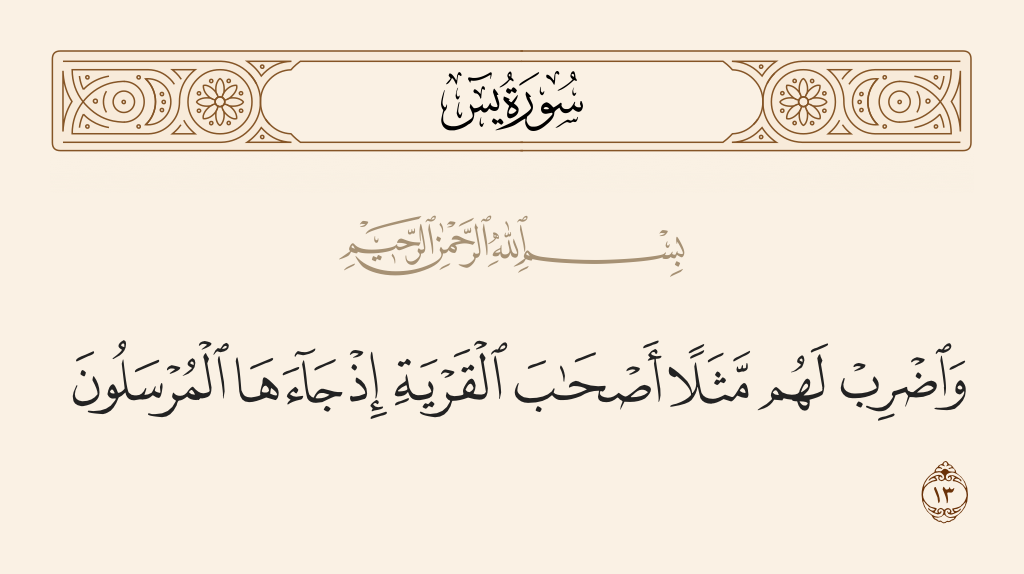Surat Ya-Sin Verse No. 13: Reading and listening
Translation of the verse 13 from Surah Ya-Sin : Number of verses 83 - - page 441 - Part 22.

﴾وَٱضۡرِبۡ لَهُم مَّثَلًا أَصۡحَٰبَ ٱلۡقَرۡيَةِ إِذۡ جَآءَهَا ٱلۡمُرۡسَلُونَ ﴿
[ يس: 13]
And put forward to them a similitude; the (story of the) dwellers of the town, [It is said that the town was Antioch (Antakiya)], when there came Messengers to them.
English - Sahih International
And present to them an example: the people of the city, when the messengers came to it -
Tafheem-ul-Quran by Syed Abu-al-A'la Maududi
(36:13) Recite to them, as a case in point, the story of the people of the town when the Messengers came to them. *10
Tafheem-ul-Quran by Syed Abu-al-A'la Maududi
*10) The early commentators, generally, have expressed the opinion that the "habitation" implies the Syrian city of Antioch, and the messengers mentioned here were the ones sent by the Prophet Jesus for the preaching of his message there. Another thing that has been mentioned in this connection is that Antiochus was the king of this land at that time. But historically this story which Ibn 'Abbas, Qatadah, 'Ikrimah, Ka'b Ahbar and Wahb bin Munabbih, and others have related on the basis of unauthentic Christian traditions is baseless. There have been 13 kings of the Seleucid dynasty named Antiochus who reigned in Antioch, and the rule of the last king of this name, rather the rule of this dynasty itself, carne to an end in 65 B.C. At the time of the Prophet Jesus, the whole land of Syria and Palestine, including Antioch, was under the Romans. Then, no proof is forthcoming from any authentic tradition of the Christians that the Prophet Jesus might himself have sent any of his disciples to Antioch for preaching his message. On the contrary, the Acts of the Apostles (N.T.) shows that the Christian preachers had reached Antioch for the first time a few years after the event of the crucifixion. Now, evidently, the people who were neither appointed messengers by Allah nor sent by His Messenger cannot be regarded as messengers of Allah by any interpretation even if they might have travelled for the purpose of preaching of their own accord. Moreover, according to the Bible; Antioch was the first city where the non-Israelites embraced Christianity in large numbers and where the Christian faith met with great success; whereas the habitation mentioned by the Qur'an was some such habitation which rejected the invitation of the messengers, and was consequently punished with a Divine torment. History also dces not bear any evidence that Antioch was ever afflicted with a destruction, which might be regarded, as the result of denying the Prophethood.
On account of these reasons it cannot be accepted that the `habitation" implies Antioch. The habitation has neither been clearly determined in the Qur'an nor in any authentic Hadith; the identity of the messengers also is not known through any authentic means nor the time when they were appointed. To understand the purpose for which the Qur'an is narrating this story here, it is not necessary to know the names of the habitation and the messengers. The object is to warn the Quraish, as if to say: `You arc following the same path of stubbornness, prejudice and denial of the truth as had been followed by the people of that habitation, and are preparing yourselves to meet the same doom as was met by them. "